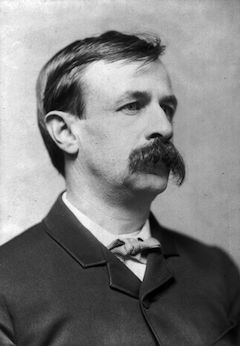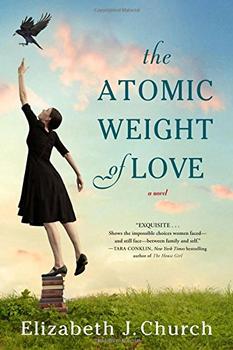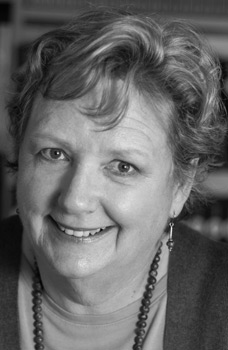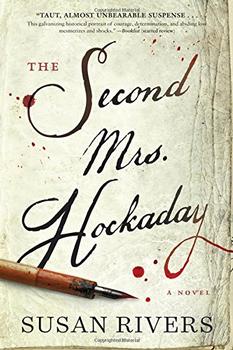Hello
 This week we review two debuts: Foreign Soil, Maxine Beneba Clark's bold and brave collection of short stories, and All Our Wrong Todays, Elan Mastai's mindbending take on our current times from the viewpoint of an unintentional visitor from a alternate utopian 2016.
Then we go "beyond the book" to look at past predictions of the present. and present predictions of the future.
Our discussion of The Atomic Weight of Love is off to a great start. Please do join us if you have read the book, and if not I encourage you to take a look at this eminently discussable book. Also in this issue we find out the true story that inspired Susan River's debut novel, The Second Mrs Hockaday, set in South Carolina during the Civil War. Your Editor, Davina |

|
  Editor's Choice Foreign Soil by Maxine Beneba Clarke
Hardcover (Jan 2017), 272 pages.
Publisher: Atria Books.
BookBrowse Rating: 5/5, Critics' Consensus: 4.5/5
The stories in Maxine Beneba Clarke's debut collection, Foreign Soil, are far ranging in time, place, and voice. They are stylistically bold, structurally innovative and brave in subject, confronting war, child soldiers, domestic abuse, gender identity, and political violence. Clarke writes with the lyricism of a poet and the starkness of a writer of Witness literature (the process of bringing to the page an event both catastrophic and far-reaching in nature and to let the words serve as as a representation of truth). Clarke's characters come from Australia, Sudan, Sri Lanka, the United Kingdom, Jamaica, China, and the United States, and each one feels fully fleshed, shaped by his or her native culture. They exist in the margins between belonging and "otherness," and Clarke catches them in moments of crises that bring our common humanity to the forefront.
Either literally or figuratively, the characters that populate these tales are on foreign soil, and to be on foreign soil is to be marginalized. In the title story, the protagonist is a white hairdresser from the suburbs of Sydney. "All her life, Ange had felt she didn't belong to the drudgery around her, to her ordinary world." Looking for, "a chance at something remarkable," she follows her Ugandan physician boyfriend to Kampala, where she is truly on foreign soil, with devastating consequences. In "Shu Yi", Ava, the young black narrator, is from, "a typical everyone-knows-everyone-else's-business-and-can-I-borrow-a-cup-of-milk-for-the-kids-breakfast-please suburban blond-brick Australia," not far removed from the neighborhood where Clarke herself grew up. Yet, also like the author, she is on foreign soil because of the color of her skin. When Shu Yi, an awkward immigrant from China enters Ava's school, Ava is confronted with the choice to either stick up for this girl with whom she can identify or to make life easier on herself by taking part in bullying that, before Shu Yi's arrival, was often directed against her ...
The stories in Foreign Soil are not about epiphany and grand plot twists; they are about the subtle shifts that occur with the intake of breath or the turn of the head, bringing choice to the forefront. Like Markie, the narrator's son in "The Sukiyaki Book Club," the semi-autographical story that concludes the collection, each character is, "a child of changes, gaps and relocations, of rumblings and shakings, of constant sound and frequent movement." Although the decision to change course is sometimes taken, sometimes not, the final words of each story feel more like a beginning than an ending, a wide-open space that opens before the reader.
Full access to our reviews & beyond the book articles are for members only. But there are always four free Editor's Choice reviews and beyond the book articles available.
|
  Editor's Choice  All Our Wrong Todays by Elan Mastai Hardcover (Feb 2017), 384 pages. Publisher: Dutton. BookBrowse Rating: 5/5, Critics' Consensus: 4.6/5 Buy at Amazon | B&N | Indie You need a great deal of time to read All Our Wrong Todays, but don't let that put you off. This intense novel is the product of an enormous, curious, swirling mind thinking in depth about science, science fiction, the human heart, life as we know it, and still more. Lots more. Do you remember the first science fiction novel you read that opened your mind to new possibilities? Convincing you of the seemingly infinite choice available in the world? You'll have that exact same feeling here. Tom Barren is the story here, a man living in a 2016 that's made up of completely clean energy, thanks to the Goettreider Engine, which uses the constant rotation of the Earth to power everything. In the novel it becomes a reality on July 11, 1965, and as a result, there's no nuclear power, no solar or wind power, no coal or oil. Because there were no fights for any kind of energy, no saber-rattling between nuclear-loaded nations, more time was available to focus on making people's lives better, more efficient. Therefore - no hunger, no social problems, no wars. A thriving utopia. And all because of the Goettreider Engine, which Tom says works because it just does. There's magnetism and gravity, but he doesn't really understand it. He's not on the level of his genius, distant father. And that's where the problem begins. Tom already feels out of sorts and out of touch with the world. His father, Victor, heads the Chrononaut Institute, which is mounting a time travel experiment. It involves going back to 1965, to Goettreider's laboratory. Tom ends up going back too. Once he is there, however, he becomes blinded by grief over losing someone close to him, which causes major problems in the lab, especially when Lionel Goettreider, the world-famous inventor, spots him. Tom hits the emergency switch to go back to 2016, and he finds himself in 2016 again, only it is more like our real 2016, which is like a dystopian nightmare for Tom. On top of that, he find himself in another body and mind, as John Barren, a famous Toronto architect. And the clean energy world previously described turns out to be from John's dreams. Tom, as John, narrates the story from this point forward, trying to come to terms with his new identity and maybe - just maybe - finding out that a real, messy life is better than a utopian one. Elan Mastai includes plenty to mull over alongside this main plot, and there is much to admire. There are thoughtful descriptions of how much better a history-laden city is when examining it through its different buildings, how you think of your parents when you're young and how that changes when you get older, and love in the crushing time of grief. Also look out for long sentences that, at first, feel like you're jumping off a cliff and plummeting, but once you get a few words in, you sprout wings and glide over the precipice. They're exhilarating. Not to mention Tom's thoughts on glass windows, cars, and books in our time, which give us fresh perspectives on these everyday objects. All Our Wrong Todays is a potent reminder that books can truly transport us. We don't have the time travel technology laid out here, but we've got lots of words. And Elan Mastai is quite an amazing guide through them all.
Full access to our reviews & beyond the book articles are for members only. But there are always four free Editor's Choice reviews and beyond the book articles available. |
  Famous Predictions for the Future
Every time we review a book we also explore a related topic. Here is the "beyond the book" article for All Our Wrong Todays by Elan Mastai
Elan Mastai is the latest in a long line of writers, thinkers, inventors, and visionaries who have speculated about what our future might look like.  All the way back in 1888, a writer named Edward Bellamy, in his novel Looking Backward, forecast the emergence of debit cards, describing the citizens of his utopia carrying a card that would pull credit from a central bank, without having to use paper money. H.G. Wells had a hand in these kinds of predictions too. For example, in his novel Men Like Gods from 1923, he envisioned e-mail: "A message is sent to the station of the district in which the recipient is known to be, and there it waits until he chooses to tap his accumulated messages. And any that one wishes to repeat can be repeated. Then he talks back to the senders and dispatches any other messages he wishes. The transmission is wireless." Ray Kurzweil, futurist, inventor, author, and a director of engineering at Google, who got started in computer programming when he was 15, has on his website a timeline of his future predictions. According to futurism.com, 86% of them have been accurate since the 1990s. ... continued Read in full | More about this book
|
  The BookBrowse Book Club  |
The Atomic Weight of Love by Elizabeth Church
"In Church's debut novel, Meridian, an amateur ornithologist learns about love and sacrifice through marriage to a Los Alamos physicist and a relationship with a Vietnam veteran. I instantly warmed to Meri as a narrator and loved following her unpredictable life story. She longs, like one of her beloved crows, to take flight into her dreams. Whether she gets there, and how, is a bittersweet journey but one you'll be glad you went along for. This would make an excellent book club read. There is so much to think about and discuss - especially relationships, women's rights, and moral decisions. "
- Rebecca Foster, BookBrowse
|
|
 Wordplay Solve our fiendish Wordplay puzzle, and be entered to win the book of your choice!
This week's Wordplay
Solve this clue: "O My D B"
The answer to last Week's Wordplay: P, H T
"Physician, heal thyself"
Meaning: Fix your own faults before pointing to the faults in others
This expression appears to have been in common use in the Roman Empire of 70 AD given that it is referenced as a proverb in the Gospel of Luke. Tradition has it that Luke was a doctor, and companion of Paul.
And he said unto them, Ye will surely say unto me this proverb, Physician, heal thyself: whatsoever we have heard done in Capernaum, do also here in thy country. And he said, Verily I say unto you, No prophet is accepted in his own country.
Luke 4:23-24, King James Version
|
 About BookBrowse
Get to know BookBrowse through our 4-part introductory series:
|
Your guide toexceptional books
BookBrowse seeks out and recommends the best in contemporary fiction and nonfiction—books that not only engage and entertain but also deepen our understanding of ourselves and the world around us.
|





 All the way back in 1888, a writer named Edward Bellamy, in his novel Looking Backward, forecast the emergence of debit cards, describing the citizens of his utopia carrying a card that would pull credit from a central bank, without having to use paper money.
All the way back in 1888, a writer named Edward Bellamy, in his novel Looking Backward, forecast the emergence of debit cards, describing the citizens of his utopia carrying a card that would pull credit from a central bank, without having to use paper money. 


